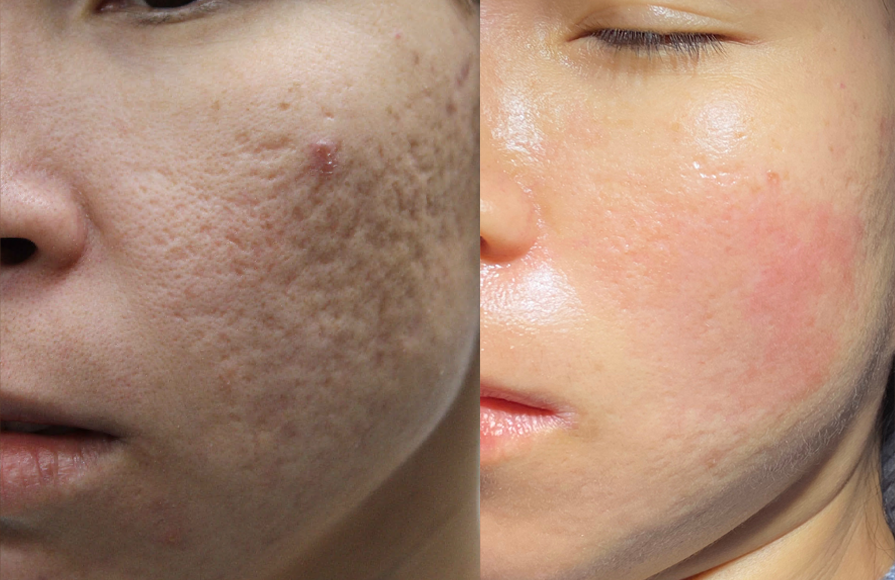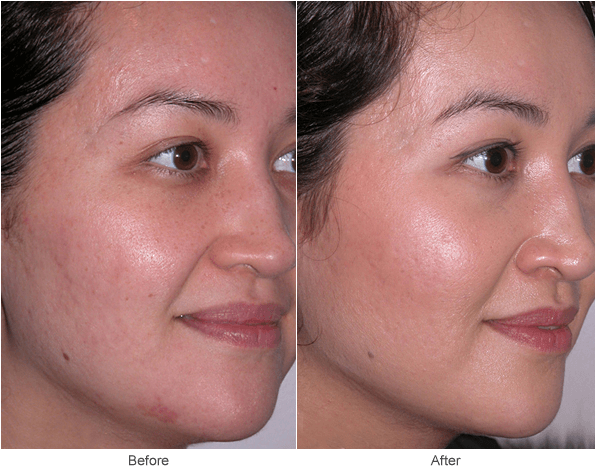Targeted Acne Scars Treatment: Attain Smooth, Even Skin Tone
Targeted Acne Scars Treatment: Attain Smooth, Even Skin Tone
Blog Article
Comprehending the Various Skin Problem and Effective Therapy Choices for Acne Scars
Acne scars represent a complex interaction of skin conditions that substantially influence individuals' self-worth and total skin wellness. As we discover the landscape of acne mark monitoring, it ends up being apparent that the trip towards clearer skin may entail even more than simply topical services.
Kinds Of Acne Scars

In comparison, hypertrophic scars result from an overproduction of collagen during the recovery procedure, resulting in raised locations on the skin. These scars are often firm and can differ in color, in some cases showing up red or darker than the surrounding skin.
Recognizing these kinds of acne marks is critical for developing a reliable treatment plan - acne and acne scars treatment. Alternatives might include chemical peels, laser treatment, microneedling, or facial fillers, tailored to the specific scar kind. A detailed appointment with a dermatologist can help determine the most suitable intervention, taking right into account the individual's skin type, mark seriousness, and general skin health
Causes of Acne Scarring
Marking happens as a result of the body's natural healing feedback to swelling and injury brought on by acne sores. When acne types, it sets off an inflammatory reaction, leading to the launch of numerous cytokines and development factors that promote healing. This process can occasionally lead to excessive cells formation or inadequate repair work, resulting in marks.
The key root causes of acne scarring include the intensity of the acne itself, period of the sores, and specific skin types. Extreme inflammatory acne, such as nodules and cysts, is a lot more most likely to result in scarring as a result of deeper cells damage. Additionally, improper handling of acne lesions, such as pressing or picking, can worsen tissue injury and inflammation, raising the possibility of scarring.
Hereditary proneness additionally plays a considerable duty; people with a household history of scarring go to a greater danger. In addition, skin type and color can influence mark formation, as darker skin tones might experience post-inflammatory hyperpigmentation, while lighter skin might develop atrophic marks.
Eventually, comprehending these causes is necessary in managing acne and mitigating the potential for scarring.

Treatment Alternatives for Scarring
Effective treatment alternatives for acne scarring differ depending on the type and intensity of the marks. Typically classified right into atrophic, hypertrophic, and keloid marks, these problems require tailored methods for optimum results.
For atrophic scars, which are identified by a loss of cells, treatments such as chemical peels, microdermabrasion, and laser treatment are generally utilized. These techniques advertise skin renewal and stimulate collagen manufacturing, thus enhancing skin texture. Subcision, a minimally intrusive procedure, can additionally work by damaging up fibrous bands underneath the skin.
Keloid check this and hypertrophic scars can be a lot more challenging to treat. Alternatives include corticosteroid shots to decrease swelling and flatten the scars. In many cases, cryotherapy or laser therapy might be recommended to lessen their look.
Surgical alternatives are available for extreme scarring, where excision or skin grafting might be essential. It's vital for people to talk to a skin doctor acne treatment for sensitive skin to evaluate their certain scar type and review the most suitable therapy plan. Combining multiple treatments commonly produces the finest outcomes, guaranteeing that each individual's one-of-a-kind skin problem is resolved successfully.
Natural Remedy and Natural Solutions
Natural options and natural home remedy can supply an obtainable approach for people looking for to enhance the appearance of acne scars (acne and acne scars treatment). Different components discovered in the home cooking area have shown possible benefits in boosting skin structure and advertising recovery

One more efficient option is lemon juice, which acts as a natural exfoliant and can lighten hyperpigmentation. It should be used meticulously, as it may trigger photosensitivity. Oat meal masks are additionally useful; their mild peeling can help eliminate dead skin cells while soothing inflammation.
Vital oils, such as tea tree oil and lavender oil, can further sustain mark recovery because of their antimicrobial residential properties. It is essential to execute a patch examination prior to applying any kind of remedy to make sure there are no adverse reactions. These natural solutions can be a corresponding technique in the journey to lessen acne scars.
Protecting Against Future Scarring
Adopting a positive approach to skincare can dramatically minimize the threat of developing future acne scars. Among the vital strategies is to handle acne efficiently as it develops. This entails using non-comedogenic skincare products and medications suggested by skin specialists that target acne without aggravating the skin. Normal cleaning, peeling, and hydration can aid maintain skin health and wellness and protect against clogged pores.
In addition, staying clear of the lure to press or choose acne lesions is vital, as this can lead to inflammation and subsequent scarring. Rather, people try this out must concentrate on applying topical therapies that advertise healing and decrease inflammation. Ingredients such as salicylic acid, benzoyl peroxide, and retinoids are recognized for their efficiency in taking care of acne and decreasing marks.
Sun protection is an additional essential part; direct exposure to UV rays can darken scars and hamper recovery. Utilizing a broad-spectrum sunscreen daily can alleviate these effects.
Lastly, keeping a healthy diet plan abundant in anti-oxidants and remaining hydrated assistances skin regrowth. By carrying out these safety nets, individuals can considerably lower their threat of future scarring and promote total skin wellness.
Final Thought
Finally, a detailed understanding of acne scars, encompassing both hypertrophic and atrophic types, is necessary for reliable treatment techniques. Tailored interventions, including expert treatments and natural remedy, can dramatically enhance skin look and appearance. Safety nets also play a crucial function in reducing future scarring. Appointment with a skin specialist continues to be crucial to devise personalized techniques that think about individual skin types and scar severity, inevitably boosting the efficiency of mark monitoring techniques.
Acne marks stand for an intricate interplay of skin conditions that significantly effect individuals' self-confidence and overall skin health and wellness. The 2 key classifications of acne scars are hypertrophic and atrophic marks. These marks are more categorized into 3 subtypes: ice pick marks, which are slim and deep; boxcar marks, which are wider and have well-defined edges; and rolling marks, which create a wave-like look due to uneven skin appearance.
A thorough consultation with a dermatologist can assist figure out the most appropriate intervention, taking into account the person's skin kind, scar extent, and overall skin health.
Appointment with a dermatologist continues to be crucial to design individualized approaches that think about individual skin kinds and scar seriousness, eventually improving the efficacy of scar management methods.
Report this page